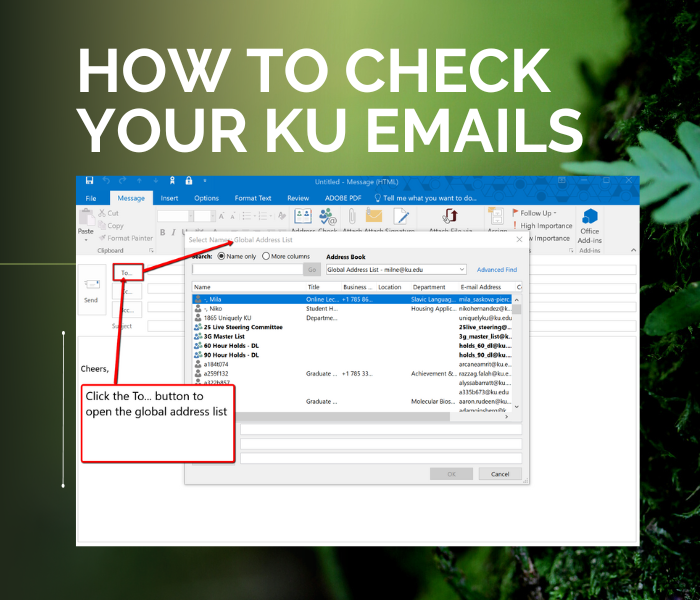How to Check Your KU Emails
-
If you are looking for information about how to check your KU emails, you've come to the right place. While we highly recommend using the Outlook Office 365 desktop/laptop email client, other email clients are acceptable. This article will show you how to set up your email account in other email clients. Then, you'll be able to check your KU emails in the most convenient way possible. You'll be able to see all your emails in a matter of minutes.

Outlook Office 365 is the recommended desktop/lap computer email client for KU email services
If you have multiple email accounts, it is essential to choose an email client that supports the features provided by KU. Outlook offers a built-in support for KU email services. It features a centralized address book, and is compatible with all of the major email providers. KU students, faculty, and staff are automatically included in the Global Address List. You will need to add contacts from outside KU, however. To add contacts to your Outlook address book, simply open the "People" tab, click on New Contact, type in the contact's name and information, and then save and close the window. Outlook also allows you to create contact groups. These groups will automatically appear on your contacts list if you want to keep track of your most recent emails. Buy Twitter Accounts
When using Outlook, be sure to enter your KU Online ID and password to sign in. You may also want to check the Knowledge Base for more information about configuring your email client. In addition to desktop computers, KU also offers Outlook for mobile devices. However, it is important to note that ActiveSync is a feature that will prompt you to allow access to your device's security settings. You can turn this feature off if you're not comfortable with this option.
Other email clients
The most common way to check your edu emails is through your web browser. However, if you need to access other email accounts, you can use another email client. Some of the email services require you to use certain protocols and settings to access them. Therefore, it is important to choose an email client that uses the Modern Authentication protocols. However, if you use an older email client, it may not be secure enough to connect to your UCSD email systems.
Apart from being secure, email clients also help you manage your emails faster. You can use different features of the email client to manage your emails, such as speed reading, email snooze button, and more. Apart from that, the email client you choose should also allow you to manage your emails even when you are offline. This way, you will not have to rely on your internet connection to check your edu emails. If your email provider does not support these features, you can use the webmail for checking and responding to emails. Buy Edu Emails
KU email account settings
If you're having trouble with your KU email account, you may want to look at the calendar sharing options. This feature is available from the People tab in Outlook. Just click the Share Calendar option and then select the To field to add KU members. Once you've added all of your KU contacts, you can use the Share Calendar option to send the message to them. You can also change the recipient's permissions and email body, as well as the email's subject line and body.
Using Outlook Web App, you can access your KU email from anywhere. To do so, simply enter your KU Online ID and password. Outlook is the recommended desktop email client. Most faculty workstations have Outlook installed. You can also install it on a personal device. KU IT recommends that you set up your account with Microsoft Outlook. To configure Outlook on your personal device, follow the instructions listed in the Knowledge Base.
Make sure your password is protected against being shared with other people. The University of Kansas provides email accounts for students, faculty, and staff members. It is the primary channel of communication between the university and its members. To maintain your account's integrity, you should check it frequently. Personal use of KU email is not prohibited, but you should follow the guidelines outlined in the Electronic Mail Policy. This policy outlines the limitations and responsibilities associated with using University email.